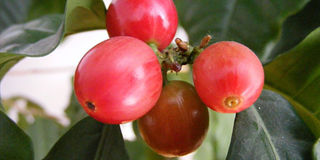Good news to farmers as coffee prices shoot up

What you need to know:
- In June and July this year, at the height of Robusta coffee harvest in the crop’s main growing areas, the price of one kilogramme of kase (FAQ) rose from Shs4,000 to Shs4,500 and most farmers sold off all the coffee they had, suspecting that the prices could drop as they normally tend to do in August.
There is a general rise for coffee prices these days. Yet farmers are struggling to get the coffee to sell and to satisfy the market.
In June and July this year, at the height of Robusta coffee harvest in the crop’s main growing areas, the price of one kilogramme of kase (FAQ) rose from Shs4,000 to Shs4,500 and most farmers sold off all the coffee they had, suspecting that the prices could drop as they normally tend to do in August.
To their surprise the prices went up and at the time of writing this column the price for a kilo of FAQ Robusta coffee is approaching Shs6,000.
The position is not any different for Arabica coffee whose price is also going up. The country had had a bumper harvest with a total production of well beyond five million bags.
Why are the prices going up? It is all linked to declining coffee production in the major coffee growing countries across the world thanks to climate change.
This year, according to media reports, Brazil experienced a devastating drought that is likely to reduce the country’s coffee production for some years.
On November 12, 2021 the New York Times came up with an article titled: “How climate change is impacting the future of coffee” authored by Tatiana Schlossberg.
It quoted a 2014 study: “--- about 50 percent of the land with conditions suitable for growing the two main species of coffee, Arabica and Robusta, which account for 99 percent of commercial supply, could disappear by 2050. Brazil and Vietnam, major producing countries, would be especially hard hit.”
The long drought that we have just gone through is bound to reduce Uganda’s coffee harvest next year since perhaps half of the crop’s flowers died under the scorching sun.
We are not even certain if we will get sufficient rainfall in January and February next year and there is a real possibility that the cherries could yellow and drop off before reaching maturity, resulting in a bitter harvest come June and July 2022.
And we have to remember that the changing climate conditions actually spoil the taste and aroma of coffee.
Mr Michael Ssali is a veteran journalist,
[email protected]




